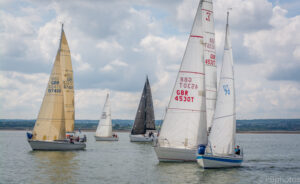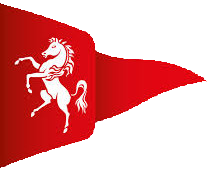Click here to return to the Main Cruiser Racing Menu
In one design classes the first boat over the finishing line is the winner as all the boats are similar. However Cruisers are of many different designs. Some cruisers are built to be seaworthy if caught out by severe weather crossing the Atlantic. Other cruisers have bilge keels to allow them to dry out and stay upright. Other cruisers are built for racing which optimise speed against a handicap system and have varying sizes of sails etc. This means a handicap system is required that can be multiplied by or divided into the elapse time to decide who wins.
Results Calculated using Yacht Time Correction (YTC) Handicaps
The results are calculated by adjusting elapse times by the YTC handicap and prizes awarded accordingly. Obtaining a YTC is free. To obtain a free YTC handicap you need to submit the overall and waterline length, the beam, draft and weight plus sail areas and a few other bits of information and in a few days, you will receive a free YTC handicap certificate. Click here to Obtain a YTC Handicap. Click to have a look to see the information that is required. Most of this information for production cruisers is available online Sail Boat Data. For those of you with something a bit rarer you may need to do some measuring. We can help with measurement if necessary. YTC handicaps are provided flying a spinnaker and also without a spinnaker called a white sail rating. Cruisers opt to fly a spinnaker or not on their entry form for a series.
Results Calculated using International Rating Certificates (IRC) Handicaps
The blue-chip handicap system is the International Rating Certificate, IRC, system where cruisers submit a lot of measurements, and profiles to the Royal Ocean Racing Club RORC plus a fee. They are issued with an IRC rating calculated by a closely guarded secret formula. Prizes will also be awarded on IRC handicaps where sufficient cruisers with IRC certificates enter our events.
MYC Club Handicaps
In 2025 MYC Club Handicaps (CH) will be used. CH will not replace calculation of results using YTC and IRC ratings but produces results in parallel to them.
CH are based on the track record of how fast cruisers have sail in past races in 2024 and 2025 where the races can be considered to give a good estimate of their speed over water. They can be expressed as the percentage of the cruiser’s YTC that has been achieved.
For new cruisers we utilise a formula based on the research by the RYA on how different cruisers perform which was published as their NHC base handicaps. These are the cruisers in the table with 0 races.
CH accepts permanent reasons why a cruiser will not sail as fast as the YTC system allows as they are adjusted based on actual results. For example a cruiser that is built to be sea-worthy in the Atlantic rather than fast for estuary sailing, where the cruiser is sailed with fewer crew, or sailed without spinnaker, or without fancy black sails, or regularly hangs back at the start to avoid the starting melee. These cruisers will win on the Club Handicap if they do better than their normal performance. They will be in a slower class so they also stand a better chance of winning using their YTC handicap.
Here is the current list of current CH and latest YTC handicaps that we have after the 2025 Spring Series and Regatta. CH are kept in line in total with the YTC so that they can be presented as a percentage of the YTC.
| After Spring 2025 | Now | |||||
| Boat | CH | % YTC | CH | % YTC | Races | |
| Mercury | 747 | 97% | 747 | 97% | 5 | |
| Xray II | 933 | 103% | 832 | 92% | 3 | |
| Aquila | 872 | 96% | 854 | 94% | 9 | |
| Chips | 867 | 90% | 882 | 92% | 18 | |
| Zephyros | 902 | 98% | 886 | 96% | 21 | |
| Countdown | 885 | 94% | 889 | 95% | 11 | |
| Equinox | 906 | 97% | 906 | 97% | 6 | |
| First Knight | 914 | 89% | 3 | |||
| Why Not? | 918 | 101% | 918 | 101% | 11 | |
| LoFlyer | 962 | 93% | 1 | |||
| Toucan | 976 | 108% | 967 | 107% | 16 | |
| Gothik | 971 | 970 | 97% | 5 | ||
| Cry Havoc | 980 | 2 | ||||
| Hotspur | 984 | 95% | 1001 | 97% | 5 | |
| Drumgold | 1001 | 114% | 1001 | 114% | 2 | |
| The Wizard | 1009 | 107% | 1009 | 107% | 3 | |
| Naiad | 1042 | 93% | 1 | |||
| Petite Fleur | 1086 | 101% | 1058 | 99% | 12 | |
| Ruby Tuesday | 1060 | 111% | 1060 | 111% | 4 | |
| Freya | 1072 | 116% | 1069 | 116% | 8 | |
| Short Wave | 1086 | 102% | 1119 | 105% | 6 | |
| Omega | 1250 | 1250 | 2 | |||
| Charu | 1170 | 102% | 1282 | 112% | 1 | |
The list is in the order of the CH. Cruiser racers will notice that the cruisers around them in the list, are the ones which they are usually close to in the race and are trying to beat. This is why CH will be used to split the fleet into classes. Splitting cruisers into classes using YTC is not practical as it mixes fast cruisers with slower cruisers in the same class.
Calculation of CH is an objective mathematical process. They will be re-calculated after each race unless the results are un-representative of sailing speeds. Techniques have been developed to minimise major tidal effects. The methodologies can be explained to anyone keen on the detailed mathematics on request.

